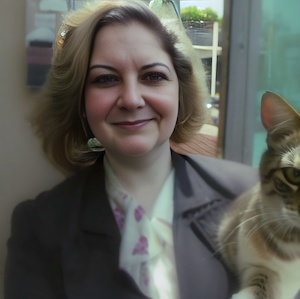As a responsible and caring cat owner, ensuring the health and well-being of your feline companion is undoubtedly a top priority. And when it comes to safeguarding them against potentially life-threatening diseases, the FVRCP vaccination plays a pivotal role.
In this comprehensive guide, we will take you on a journey through the world of FVRCP vaccination and shed light on why it is a crucial aspect of responsible pet ownership.
Whether you are a new cat owner or simply seeking to deepen your understanding of feline health, this article will provide you with valuable insights and knowledge.

We will explore the significance of FVRCP vaccination, unravel the diseases it protects against, and address common concerns and misconceptions surrounding this essential preventive measure.
By the end, you will have a clear understanding of why FVRCP vaccination is vital for your cat’s well-being and how it contributes to their overall health.
So, let’s embark on this educational journey together as we uncover the importance of FVRCP vaccination for cats, ensuring that your furry friend remains happy, healthy, and protected from the dangers that may lurk in their environment.
What Is FVRCP and Why Is it Important for Cats
The FVRCP vaccine is a combination vaccine that protects against three common viral diseases in cats: Feline Viral Rhinotracheitis (FVR), Calicivirus (FCV), and Panleukopenia (FPV). All three of these diseases can cause serious infections, and all three can potentially be fatal.
Feline viral rhinotracheitis (FVR) is caused by a herpes virus that infects the upper respiratory tract of cats. It can cause sneezing, runny nose, watery eyes, fever, and sometimes pneumonia.
FVR is highly contagious and can spread through direct contact or through the environment. There is no cure for FVR, and infected cats may have recurrent flare-ups throughout their lives.

Calicivirus (FCV) is another virus that affects the upper respiratory tract of cats. It can cause similar symptoms as FVR, but also oral ulcers, joint swelling, limping, and sometimes systemic disease.
FCV is also highly contagious and can spread through direct contact or through the environment. Some strains of FCV are more virulent and can be fatal.
Panleukopenia (FPV) is also known as feline distemper. It’s a virus that attacks the gastrointestinal tract and the immune system of cats. It can cause vomiting, diarrhea, dehydration, fever, and secondary infections.
FPV is very contagious and can spread through direct contact or through contaminated objects. FPV has a high mortality rate, especially in young kittens.
The FVRCP vaccine can help prevent these diseases by stimulating your cat’s immune system to produce antibodies that fight off the viruses.
The vaccine can also reduce the severity and frequency of symptoms in cats that are already infected with FVR or FCV.
The vaccine cannot cure these diseases, but it can make them more manageable and less life-threatening.
How Often Should Your Cat Get the FVRCP Vaccine?
The FVRCP vaccine schedule depends on your cat’s age and risk factors. Generally, kittens should receive their first dose of the FVRCP vaccine between 6 and 8 weeks of age.
Then, they should receive booster doses every 3 to 4 weeks until they are 16 to 20 weeks old. After that, they should receive a booster dose at one year of age.

Adult cats that have never been vaccinated or have an unknown vaccination history should receive two doses of the FVRCP vaccine 3 to 4 weeks apart.
Then, they should receive a booster dose every 1 to 3 years depending on their risk factors. Your veterinarian can advise you on the best vaccination schedule for your cat based on their lifestyle and health status.
What to Expect After the FVRCP Vaccination?
After the FVRCP vaccination, your cat may experience some mild side effects such as soreness at the injection site, lethargy, fever, or decreased appetite for a day or two.
These side effects are normal and usually resolve on their own. You can offer your cat some extra water, food, and attention to help them recover.
You should also avoid exposing your cat to other cats that may be sick or unvaccinated for a few weeks after the vaccination, as your cat’s immune system may be temporarily weakened.
You should also keep your cat indoors and away from any potential sources of infection or stress.
If your cat develops any signs of an allergic reaction or injection site sarcoma, you should seek veterinary attention immediately. These are rare but serious complications that require prompt treatment.
Risks of FVRCP Vaccination
Like any medical procedure, FVRCP vaccination has some risks and side effects. However, these are usually mild and rare compared to the benefits of the vaccine.
Some common and mild side effects of FVRCP vaccination include:
- Soreness at the injection site
- Lethargy
- Fever
- Decreased appetite
These side effects usually resolve within a day or two after vaccination. You can help your cat feel more comfortable by providing fresh water, soft food, and a warm place to rest.

Some rare and serious side effects of FVRCP vaccination include:
- Allergic reactions
- Injection site sarcomas
- Vaccine-associated feline sarcoma virus infection
These side effects are very uncommon but can be life-threatening if not treated promptly. You should monitor your cat for any signs of adverse reactions after vaccination, such as:
- Hives
- Swelling
- Difficulty breathing
- Vomiting
- Diarrhea
- Lumps or bumps at the injection site
If you notice any of these signs in your cat after vaccination, contact your veterinarian immediately.
FAQs
How often does my cat need FVRCP vaccinations?
After the initial series of vaccinations, cats typically require booster shots to maintain their immunity. The frequency of booster vaccinations can vary depending on various factors, including your cat’s lifestyle, age, and overall health. Your veterinarian will provide you with a recommended vaccination schedule for your specific cat.
Can indoor cats benefit from FVRCP vaccination?
Yes, even indoor cats can benefit from FVRCP vaccination. Although they may have limited exposure to infectious agents, it’s still possible for them to be exposed through contact with humans, other animals, or contaminated objects. Additionally, if an indoor cat accidentally escapes or is exposed to a new environment, they can be at risk. Vaccination helps provide an added layer of protection.
Is FVRCP vaccination safe for pregnant cats?
FVRCP vaccination is generally not recommended for pregnant cats. It is advisable to vaccinate cats before they become pregnant or after they have finished nursing their kittens. However, always consult with your veterinarian for guidance specific to your cat’s health and situation.
Can my cat experience an adverse reaction to FVRCP vaccination?
While adverse reactions are rare, some cats may have allergic reactions or experience more severe side effects. Signs of a potential adverse reaction include facial swelling, difficulty breathing, vomiting, diarrhea, or collapse. If you notice any concerning symptoms after vaccination, contact your veterinarian immediately.
Conclusion
In conclusion, FVRCP vaccination for cats is an essential aspect of responsible pet ownership. By protecting against Feline Viral Rhinotracheitis, Calicivirus, and Panleukopenia, this combination vaccine plays a crucial role in keeping our feline friends safe and healthy.
Throughout this guide, we have explored the significance of FVRCP vaccination, from understanding the diseases it prevents to addressing common questions and concerns.
We have learned that starting the vaccination series at the appropriate age, following the recommended booster schedule, and discussing any concerns with our veterinarians are vital steps in ensuring the effectiveness and safety of the vaccine.
While no preventive measure can offer a 100% guarantee, FVRCP vaccination significantly reduces the risk of cats contracting these contagious diseases. It provides them with a stronger defense and a better chance of recovery if they do come into contact with the viruses.
Remember, whether your cat is an indoor companion or enjoys outdoor adventures, FVRCP vaccination remains crucial. It not only protects them but also helps prevent the potential spread of diseases to other cats in the community.

Charlene Pare is the founder of Cat Likes Best. She manages and strategizes the content published on this website. When she isn’t working, she enjoys exploring the city around with her Ameican Shorthair kitty–Moli. Being a technocrat and an avid cat lover, she also writes on pet tech products and some of the featured articles.

